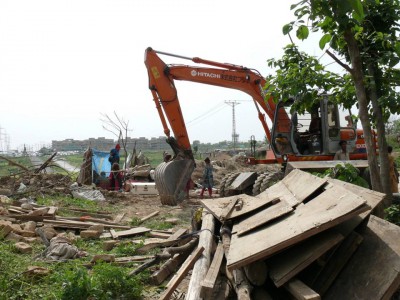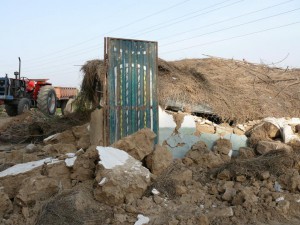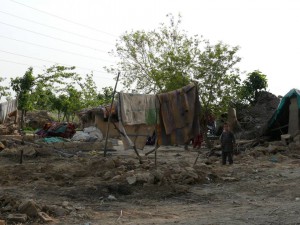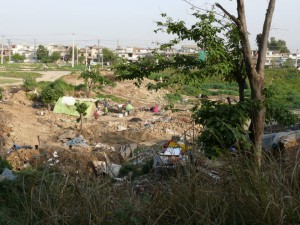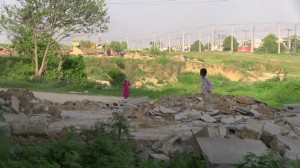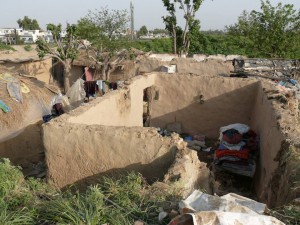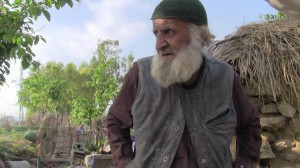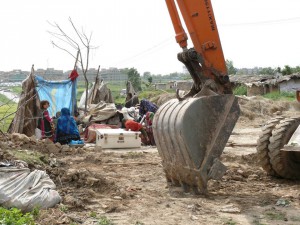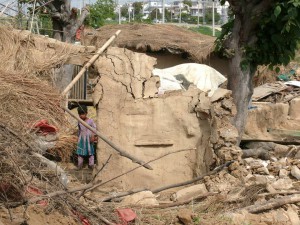Monday, April 14: The CDA and Islamabad Police organized the demolition of dozens of katchi abadi homes along I-10 and H-10 today, rendering hundreds of people in those informal settlements homeless. Many of the residents who were evicted were either refugees from Afghanistan, or internally displaced people from Balochistan and FATA. Most did not resist or organize against the evictions because of fear of possible arrest, deportation or violent reprisal from the state. The situation in the abadis was tantamount to a man-made humanitarian disaster, with hundreds of people, including women and children, being deprived of homes without restitution or resettlement. All of these people are now without any form of shelter.
The authorities also wanted to attempt the demolition of the nearby H-11 katchi abadi (populated largely by Pakhtuns from Khyber-Pakhtunkhwa) but were prevented from doing so by the organized residents and members of APAKA, who turned up in large numbers to confront the bulldozers.
It is to be noted that today’s evictions (regardless of the origin of the residents) are in violation of several domestic and international legal and constitutional frameworks that deal with refugees and forced evictions, including the 1966 International Covenant on Civil and Political Rights, Pakistan’s constitutional right to shelter and the 2001 National Housing Policy, all of which the state of Pakistan is bound to uphold.
The current spate of evictions is proof that the authorities in Islamabad have decided to target (at least initially) the weakest segments among the slumdwellers, those who are legally vulnerable, un-organized and unrepresented. In targeting the most vulnerable, they wish to escape scrutiny for the evasion of several constitutional and legal obligations that they are not willing to meet.
The APAKA is attempting a meeting with the CDA again tomorrow to resolve the issue of katchi abadis before large scale social disruption and upheaval becomes inevitable.
Source: Facebonks – search and you will find. Alternative non-commercial sites are better though.
About the All-Pakistan Katchi Abadi Alliance:
The All-Pakistan Katchi Abadi Alliance is an association of slum-dwellers from across the country, originally formed in 2003 during Musharraf’s era. Created to protect the rights of the millions of katchi abadi residents across the country.
Description
Introduction:
The All-Pakistan Alliance for Katchi Abadis is an association of slum-dwellers from across the country, originally formed in 2003 during Musharraf’s era. Created to protect the rights of the millions of katchi abadi residents across the country, the Alliance was the first nationally-organized resistance by slum dwellers in Pakistan against arbitrary eviction and forced homelessness by the state and was instrumental in securing basic rights for slum dwellers across the country and forcing much-needed political spotlight on the need for sustainable solutions for low-income housing in Pakistan.
Currently, in light of new assaults on the rights of the homeless and marginalized, the APKAA is working in several katchi abadis in Islamabad and Rawalpindi (with around 150,000 residents) to raise rights awareness, provide social, political and legal education, encourage peaceful mobilization for housing and land reform and encourage greater public participation in government decision-making.
Background and Context:
Since the development of Islamabad in the 1960s, the city has experienced an unprecedented degree of urban expansion, capitalist growth, economic, post-conflict and post-disaster migration and increased poverty. One of the symptoms of this development path has been the expansion of slum settlements or katchi abadis across the city. These abadis are home to some of the most socially and economically marginalized sections of the city’s population, including the working poor and large numbers of religious minorities. The slum residents are, in many ways, integral to the Capital’s economy, providing a steady, local source of labor for jobs and services crucial to Islamabad’s development, health and upkeep (often in professions – such as domestic help, sanitary work and wage labor – unpalatable to Islamabad’s better-off residents).
However, most of the residents of these slums have tenuous ownership and control over their homes, livelihoods and lives at large, given the perennial threat of eviction and the often-arbitrary exercise of coercion and violence by the state, against which they possess little social or legal protection. The residents also lack, to a large extent, the basic public services that the rest of the city takes for granted, such as clean water, reliable electricity, gas, sanitation, schools, roads and infrastructure. Many of the resident populations, particularly those from minority groups, are further faced with discrimination and systematic social exclusion from the wider society that surrounds them as well as capricious intimidation and incarceration by the police, further inhibiting their opportunities for socio-economic mobility and a peaceful, dignified existence.
Under the policy direction decided upon in the National Housing Policy 2001, the majority of existing katchi abadis were to be regularized and upgraded, with the dwellers being granted ownership rights of the land which they were occupying and the Capital Development Authority (CDA) developing services like electricity, gas and water in the settlements. However, the vast majority of katchi abadi residents have been unable to obtain housing rights and the pace of development in the existing katchi abadis has also slowed to a halt. Despite the clear directive in the 2001 Housing Policy of not evicting slum-dwellers without alternative shelter, forced evictions have been commonplace in the past decade.
Under the conservative administrative and policy agenda of the newly elected PMLN government in Islamabad, the residents of Islamabad’s katchi abadis are now facing the renewed prospect of collective homelessness, with eviction notices being communicated and clearance drives being planned by the CDA and police departments in the name of development, anti-encroachment and security. In the midst of this planned assault on their lives, the residents have little access to political representation, being largely unorganized communities that are ignored by mainstream parties with the exception of canvassing for their votes come election time.
Our activities – What we do:
The All Pakistan Katchi Abadi Alliance in Islamabad, assisted voluntarily by members of the Awami Workers Party, is working with residents of over 14 slums in the city with a collective population of approximately 150,000 people, along four main lines of action, for which support, collaboration and funding is required.
1. Consciousness/Awareness-Raising:
The APKAA organizes regular meetings, discussions and work sessions with groups of men and women in different abadis that focus on the following activities:
a. Disseminating information about past and present government policies, actions and initiatives.
b. Dialogue about the economic, social and political power structures that exist in the country and beyond.
c. Raising awareness about the political and legal rights of the abadi residents, as slum-dwellers and citizens of Pakistan.
d. Outlining the need for peaceful social, political and community organization beyond religious, sectarian, ethnic and gender differences.
2. Organization:
The APKAA supports Katchi Abadi residents in building and strengthening existing forms of community organization, in order to help them resist illegal and unjust attempts at eviction and create a sustainable organizational structure for the future defense of their rights and positioning of their lawful demands (for instance, related to access to basic services, security and physical improvements of the settlements). Within each abadi, the APKAA is working with slum residents to form local organizational units (including special women and youth units) and develop internal mechanisms of communication and coordination. In the process it is fostering collaboration between katchi abadi residents, civil society, students, academics, leaders from previous movements and the organized landless from other parts of the country, creating spaces for discussion, joint-lobbying strategies and mobilization.
3. Communication:
The APKAA is implementing activities aimed at creating sustainable communication networks and information dissemination mechanisms within katchi abadis, to enhance their capacities to engage in concerted collective action for securing their rights. To do this, the Alliance is focusing on strengthening the abilities of youth and women’s groups to utilize means of communication, expression and information dissemination, such as wall painting, informative pamphlets, and the use of social media and information and communication technologies. The APKAA also diffuses information externally in mass media (print, internet, radio and television), student networks, and social organizations nationally and otherwise, to generate awareness and public support aimed at influencing government decisions and future policies regarding the distribution of land, shelter, public services and other critical resources.
4. Influencing decision-making at local and national levels:
In order to actively influence governmental decision-making regarding the provision of affordable housing and land to the deserving as required by the constitution and the dire situation on the ground, the APKAA is planning two main courses of action over the following months:
a. In the short term, social and political mobilization, through the organization of a Rally on Land Rights, to coincide with date for the Supreme Court’s hearing of the Awami Workers Party’s petition for a judicial review of previous rulings on land reform. This rally will involve both katchi abadi residents from the twin cities as well as organized landless farmers from South Punjab.
b. In the medium-to-long term, the APKAA is attempting to facilitate and the active participation (both as voters and candidates) of katchi abadi residents in the upcoming local bodies elections, with a view to securing adequate and proximous representation for katchi abadi residents in local government and strengthening marginalized voices in public decision-making in the process.
Source: Facebonks – search and you will find. Alternative non-commercial sites are better though.
